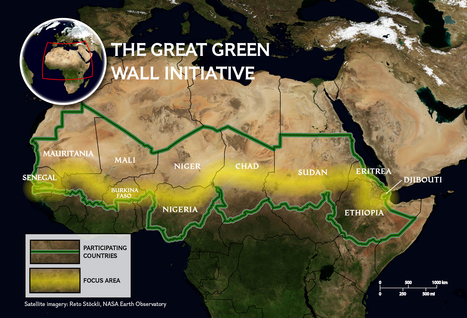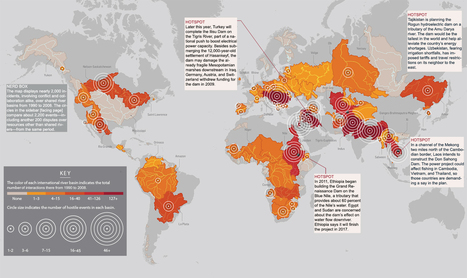"A 3-minute journey through the last 250 years of our history, from the start of the Industrial Revolution to the Rio+20 Summit. The film charts the growth of humanity into a global force on the equivalent scale to major geological processes."
Get Started for FREE
Sign up with Facebook Sign up with X
I don't have a Facebook or a X account
 Your new post is loading... Your new post is loading...
 Your new post is loading... Your new post is loading...
Adam Deneault's curator insight,
December 14, 2015 5:53 PM
The great green wall initiative project, is a project which wants to plant tens of thousands of trees, roughly fifty thousand trees alone in Senegal. The point of this is to restore a failing environment. Around five hundred million people are living in a desertification area. Both human and nature is at fault for this creation of a transition zone getting bigger and bigger, Humans are not necessarily taking care of the land like it should be taken care of and as for factors of nature such as climate change, drought and not enough rain. There are social impacts that may affect the area too, experts think that improvements in land and economy may help curb terrorism in Mali. 
Matt Ramsdell's curator insight,
December 14, 2015 11:59 PM
The great green wall is a way of separating the desert from the rain forest in Africa The Sahel is the area that separates the deforestation and the desert and would be a way to keep the desert in a different climatic region of the country. 
Martin Kemp's curator insight,
December 17, 2015 2:40 PM
this a great i think, the only way that countries in an area with such harsh environments can survive is by helping eachother and using their own beneficial land to help other and recieve help for their own deficiencies. |

J. Mark Schwanz's curator insight,
June 21, 2014 11:01 AM
Add water to geography education curriculum? You better believe it. The crisis of the 21st century is and will be water. 
Courtney Barrowman's curator insight,
May 21, 2015 11:36 AM
summer reading KQ2: How have humans altered the Earth's environment? Water Security 
James Piccolino's curator insight,
March 24, 2018 10:01 AM
The idea of going to war over water is a scary one, but is still possible in an unfortunate future. After all there must have been a time when going to war over oil was a scary possibility and nothing more. Water being a necessity would surely make it more justified in the minds of many, but would lead to disaster down the line.
|












добавить свой понимание ...
Summer reading KQ1: How has the Earth's environment changed over time?
Many geologists and other scientists now recognize that we are in a new geologic era. This new era, called the Anthropocene, is distinguished by the fact that one species (homo sapiens), is dramatically modifying the environment. These modifications are impacting geologic processes to such a degree that this time period is geologically distinct (see this remote sensing interactive for examples of environmental change). Paul Crutzen, a Nobel Prize–winning scientist who champions the term Anthropocene declared, “It’s no longer us against ‘Nature.’ Instead, it’s we who decide what nature is and what it will be.” This video is a great primer for discussing the nature and extent of human and environmental interactions as related to industrialization, globalization and climate change. This is definitely one of my favorite resources.